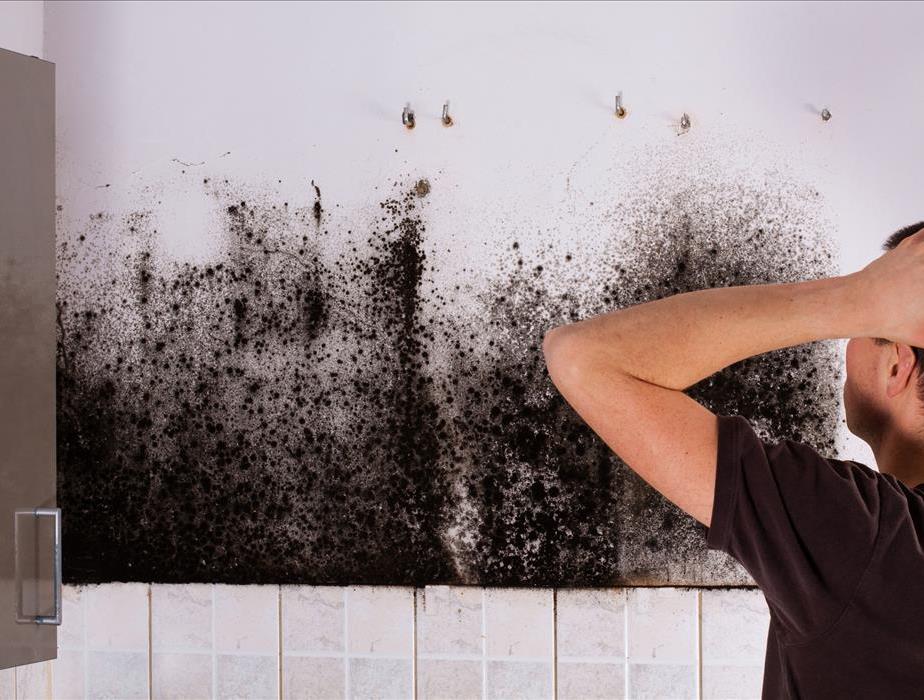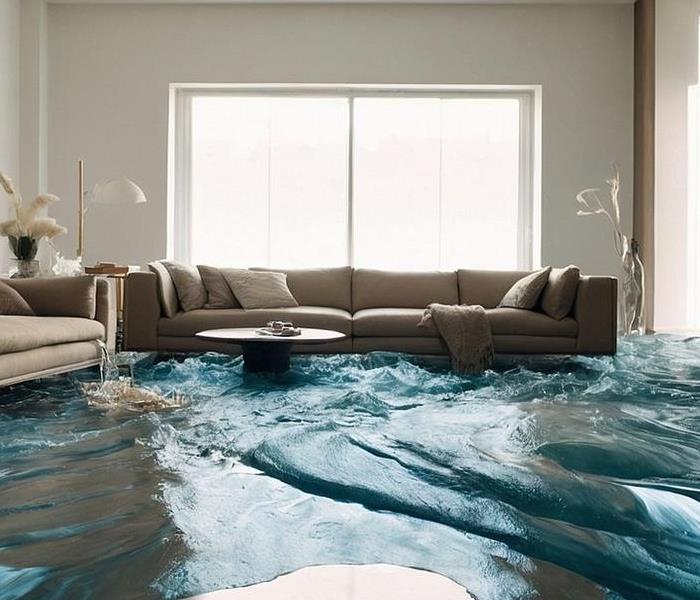Recent Posts
The 3 Signs of Mold
5/24/2024 (Permalink)
Mold is a type of fungus that develops from tiny spores that float around in the air, both indoors and outdoors. Mold is often found in humid or moist places, and if allowed to grow unchecked, it can present issues for a building. With that in mind, we offer this quick list to help you identify mold is growing in your building:
1) Musty Odor
Even if you cannot see mold, it can be in your home or business. A very common indicator of the fungus is its smell. When mold grows in an area of your building, you will notice a pungent and musty smell. Take action immediately when you notice the odor. Mold overgrowth can cost you a great deal of money and even your health. You may not be aware of the full extent of the problem until professionals check in between walls and under floors.
2) The Appearance of Mold
Mold may look like cotton, granules, or leather. It can appear in various colors like white, green, gray, black, brown, or yellow. Unfortunately, many people ignore small mold and mistake it for soot or ordinary dirt. Take immediate action when you see tiny discolored and fuzzy growth on furnishings or the surface of building materials.
3) Water Leaks
If you notice water leaks from ceiling pipes, water stains, or standing water, mold might become an issue. Water leaks cause moisture, and that provides an excellent growing place for mold. Check for discoloration or watermarks on carpets, walls, and other materials for hidden mold.
Any business or home can face a fungus fiasco. If you suspect that you have a mold problem, SERVPRO® can inspect the property. Mold remediation is one of our specialties and we can eliminate the issue safely. We also invest in state-of-the-art equipment and continuous training that ensures your home or business is quickly and efficiently restored.
Give us a call today!
Clearing the Air: How SERVPRO® Eliminates Odors for Good!
5/9/2024 (Permalink)
Odors, it's a word that is not pleasing to the ear nor to the nose. Smelling an odor throughout your home or business can be intolerable, especially if you do not know where it is coming from. People often attempt to get rid of the odor by spraying air freshener and while it is a temporary fix, it does not completely eliminate the odor.
This is because they are simply masking the odor instead of eliminating it. Fortunately, SERVPRO specializes in eliminating persistent smells such as smoke, pet urine, and other foul scents whether it is inside or outside. Our advanced equipment allows us to target the source and leave your home or business smelling fresh. Here is how we do it in just 4 steps:
1. Remove the source of the odor. The odor removal process starts with identifying the source of the smell and removing it. If not removed, debris contaminated with odor-causing residues will continue to give off the odors which will interfere with the cleaning process.
2. Clean residues from surfaces. Once the source of the odor is removed, our technicians will properly clean the surfaces to deodorize them effectively using advanced equipment.
3. Re-create the conditions that caused odor penetration. Our technicians then distribute a deodorizer to the surface in a manner similar to the way the odor-causing substances penetrated the surface.
4. Seal Surfaces Exposed to Unpleasant Odors. This step is more for severe situations when an odor removal is impractical and the only solution is to seal the location where the odor is coming from.
SERVPRO’s priority is to leave your home or business smelling fresh and feeling clean.
Our uniquely trained professionals will identify the source of any foul odor and eliminate it from your home or business. Inside or outside, you can count on SERVPRO for your odor elimination needs at any time of the day.
What To Do When You Have Water Damage
4/19/2024 (Permalink)
Water damage can wreak havoc on your home or property. Water damage can occur from burst pipes, leaking roofs, storms, floods, and hurricanes. The consequences can be devastating, leading to structural damage, mold growth, and potential health effects.
When facing these situations, it is best to contact a restoration company like SERVPRO. However, here are some simple actions you can take while you wait on a SERVPRO team to arrive at your home.
Turn off the Power
Attempt to safely switch off the electricity and gas to avoid electrocution and gas leaks. If unable to do so due to an extensive amount of water in the home, wait for a SERVPRO team to arrive and cut the power off.
Locate and Stop the Water Source
Identify where the water is coming from. If it is coming from a burst pipe or leaking appliance, turn off the water supply to prevent further flooding.
If the source of the water is external, such as a storm or flooding, do your best to divert or contain the water from further damaging your home and furniture.
Remove Excess Water
Use pumps, wet/dry vacuums, buckets, or towels to remove as much water as possible from the affected area. The faster you can extract the water, the better chance you have of preventing further damage and mold growth.
Move Belongings Out of Water
To prevent further damage to your furniture, move them to another room that is dry. If you have heavy furniture that you are unable to lift and move around, wait for a SERVPRO team to arrive to assist with moving the furniture.
SERVPRO also specializes in restoring any piece of furniture that has been damaged during the disaster.
Call your Insurance Company
Once you have done all the above, now is the time to contact your insurance company and investigate what is covered in terms of water damage. Document the damage thoroughly and file a claim with your insurance as soon as possible in order for you to get reimbursed for the costs of mitigation.
Dealing with water damage is a long and stressful process. Luckily, SERVPRO is available 24/7 with a team of certified professionals who are equipped with advanced equipment to resolve disasters like these.
SERVPRO, the only restoration company that makes “Like it never even happened,” happen.
Ozone Gas and Restoration: How is it Used?
5/24/2023 (Permalink)
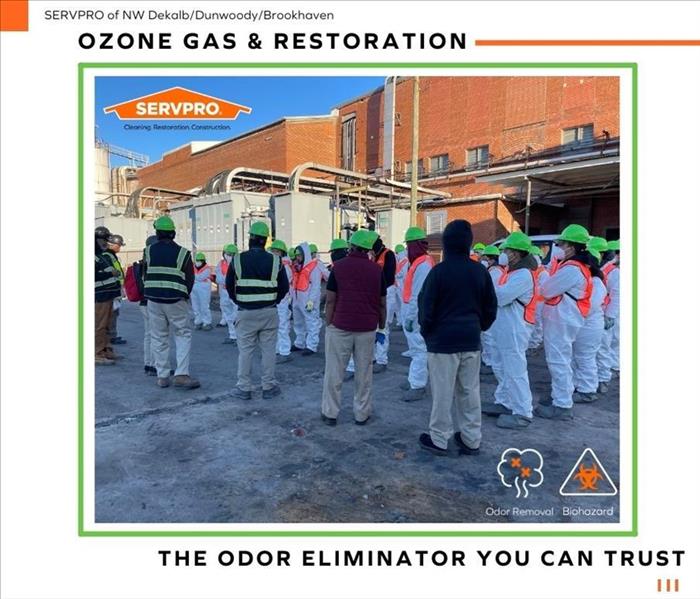 Our SERVPRO Disaster Recovery Team is equipped to handle any type or severity of biohazard and fire damage here in Brookhaven, GA & surrounding areas.
Our SERVPRO Disaster Recovery Team is equipped to handle any type or severity of biohazard and fire damage here in Brookhaven, GA & surrounding areas.
When you think about restoration services, the idea of ozone gas probably doesn't come to mind. However, at SERVPRO of NW Dekalb/Dunwoody/Brookhaven, we utilize this powerful resource in various ways, including biohazard cleanup and odor removal.
What is Ozone Gas and How Does it Work to Eliminate Odors?
Ozone gas is a powerful odor eliminator due to its unique chemical properties. Here's a simplified breakdown of how it works to eliminate odors:
- Ozone Generation: Ozone gas (O3) is created by adding an extra oxygen atom to stable oxygen molecules (O2). This is typically done using ozone generators, which produce ozone by either silent corona discharge or ultraviolet radiation.
- Oxidation Process: Ozone is highly reactive, thanks to the instability of the extra oxygen atom. When ozone comes into contact with odor-causing molecules (like those found in smoke, mold, or biohazards), it instigates an oxidation process. This process involves the transfer of electrons from the odor-causing molecule to the ozone molecule, resulting in the odor molecule being chemically altered.
- Odor Neutralization: This chemical alteration effectively breaks down the odor-causing molecule, neutralizing the odor. The ozone molecule itself turns into an oxygen molecule (O2) in the process, which is why ozone is often referred to as a "natural" odor neutralizer.
It's important to note that while ozone can be very effective at eliminating odors, it is also a strong oxidizer and can be harmful to people, pets, and certain materials if used improperly. Therefore, ozone treatments should only be conducted by trained professionals like our SERVPRO of NW Dekalb/Dunwoody/Brookhaven restoration team in a controlled environment, and the treated area should be adequately ventilated before re-occupancy.
The Role of Ozone Gas in Biohazard Cleanup
Biohazard cleanup is one area where ozone gas shines. This type of cleanup involves the removal, cleaning, and disinfection of materials that have been in contact with biohazards, such as bodily fluids, blood, or toxic substances. During these cleanups, offensive odors can permeate the air, making the task of sanitizing the area even more challenging.
That's where ozone gas comes in. By generating ozone gas in a confined space, we can efficiently eliminate these unpleasant odors, making the area safer and more comfortable for occupants.
Ozone Gas in Fire and Smoke Restoration
Ozone gas is also a key player in fire and smoke restoration. It's especially useful in addressing smoke odor, one of the most stubborn smells to remove. After a fire, smoke can infiltrate various materials in a property, leaving behind an intense odor that lingers long after the flames are out.
The introduction of ozone gas helps to neutralize these stubborn smells. It reacts with the smoke odor molecules, effectively 'oxidizing' them and eliminating the unpleasant smell. This makes it an essential part of restoring a property to its pre-fire condition.
The Benefits of Ozone Gas in Restoration
Beyond its impressive odor-neutralizing properties, ozone gas offers several other benefits:
- Efficiency: Ozone gas can permeate all areas of a property, including hard-to-reach spaces, ensuring a thorough cleanup.
- Eco-Friendly: Once ozone gas has done its job, it reverts back to regular oxygen, leaving no harmful residues.
- Versatile: Whether it's biohazard cleanup, smoke and fire damage restoration, or tackling other offensive odors, ozone gas proves to be a versatile tool.
Trust the Experts in Ozone Gas Restoration
At SERVPRO of NW Dekalb/Dunwoody/Brookhaven, we understand the power and potential of ozone gas in restoration work. From biohazard cleanup to smoke odor removal, we leverage this powerful resource to provide you with the highest standard of clean.
Remember, when disaster strikes, it's not just about repairing the damage; it's about restoring your comfort and peace of mind. Trust our expert team to make it “Like it never even happened.” If you need our services, don't hesitate to reach out to us. We're here for you 24/7.
Signs That It's Time for a Professional Plumbing Inspection
4/20/2023 (Permalink)
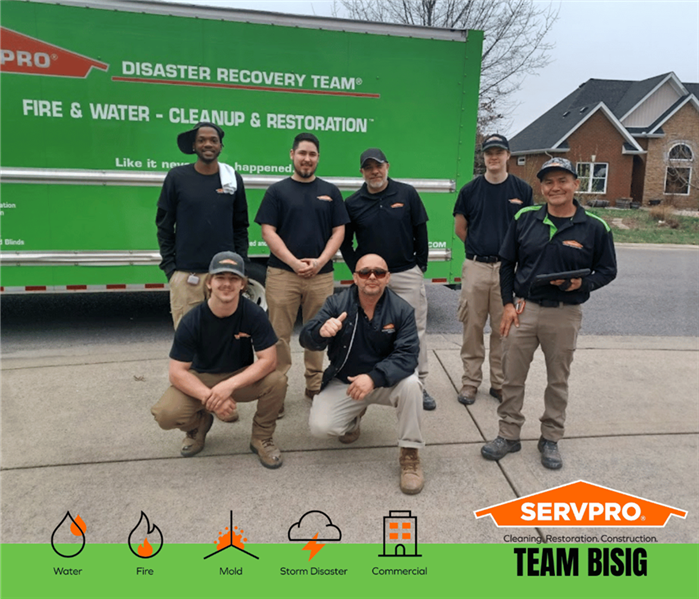 Our local SERVPRO team is here to help 24/7/365. Whether you live in Dekalb County, Brookhaven, or anywhere in between.
Our local SERVPRO team is here to help 24/7/365. Whether you live in Dekalb County, Brookhaven, or anywhere in between.
A well-functioning plumbing system is vital for the comfort and safety of your home or business. Over time, pipes and fixtures can develop issues that may lead to water damage if not addressed promptly. Regular professional plumbing inspections can help you avoid costly repairs and the need for water damage restoration services. In this blog post, we'll explore the signs that it's time to call in the experts for a plumbing inspection at your property.
- Persistent Clogs and Slow Drains A common plumbing issue that warrants a professional inspection is the presence of persistent clogs or slow-draining sinks, tubs, and toilets. These problems can indicate a blockage in the pipes or a more serious issue like a collapsed or damaged sewer line. A professional plumber can diagnose the cause of the problem and recommend the best course of action for resolving it, potentially saving you from the need for water damage restoration services down the line.
- Unusual Sounds or Odors If you notice strange sounds, such as gurgling or banging, coming from your pipes or fixtures, it's a sign that something isn't right within your plumbing system. Similarly, unpleasant odors like sewage or musty smells can indicate a problem with your pipes, drains, or venting system. A professional inspection can help pinpoint the source of the issue and recommend the necessary repairs or maintenance to prevent further damage.
- Water Stains and Visible Mold Growth Water stains on your walls, ceilings, or floors can indicate a hidden leak in your plumbing system. Mold growth, especially in areas where it wasn't previously present, is another sign that you may have a plumbing issue. Mold thrives in damp environments, and its presence can signify a leak or excess moisture from a plumbing problem. Addressing these issues promptly can help prevent the need for extensive water damage restoration efforts.
- Increased Water Bills A sudden spike in your water bill may be a sign that you have a hidden leak in your plumbing system. If you haven't increased your water usage but your bill has gone up, it's worth having a professional inspection to identify any issues that may be causing the increase. Fixing leaks and addressing other plumbing problems can help you save on your water bill and avoid the need for water damage restoration services.
- Discolored or Rusty Water If you notice discolored or rusty water coming from your faucets, it may be a sign that your pipes are corroded or damaged. This can lead to leaks and other issues that can cause significant water damage if not addressed promptly. A professional plumbing inspection can help you determine the cause of the discolored water and recommend the necessary repairs to prevent further damage.
The Importance of Professional Plumbing Inspections
Regular professional plumbing inspections are essential for maintaining the health and safety of your home or business. By identifying and addressing potential issues early, you can avoid costly repairs and the need for water damage restoration services. At SERVPRO of NW Dekalb/Dunwoody/Brookhaven, we understand the importance of proactive plumbing maintenance and are here to help you keep your property in top condition.
Conclusion:
Don't wait until you're faced with significant water damage to address plumbing issues. By watching for the signs that it's time for a professional plumbing inspection and taking action when needed, you can protect your property from costly repairs and the need for water damage restoration services. If you suspect that you have a plumbing issue or would like to schedule a routine inspection, contact SERVPRO of NW Dekalb/Dunwoody/Brookhaven today. Our team of experienced professionals is here to help you maintain a safe, healthy, and comfortable environment in your home or business.
Fire Damage Restoration Equipment: Revolutionizing the Process with Advanced Technologies
4/3/2023 (Permalink)
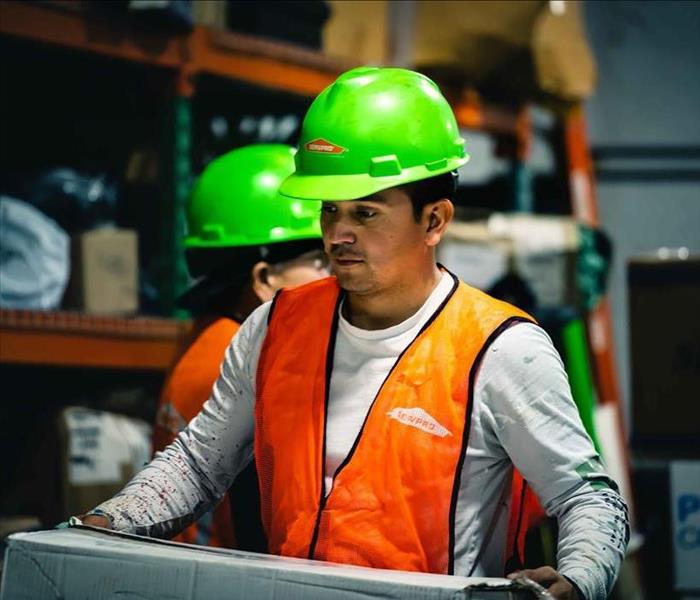 Our SERVPRO team is committed to providing best-in-class fire damage cleanup and soot removal services throughout North Atlanta, Chamblee and more.
Our SERVPRO team is committed to providing best-in-class fire damage cleanup and soot removal services throughout North Atlanta, Chamblee and more.
Fire damage can be devastating, leaving homeowners and business owners with the daunting task of restoring their property to its pre-fire condition. Fortunately, advances in technology have significantly improved the fire damage restoration process, making it more efficient and effective. In this blog post, we'll discuss the cutting-edge equipment used by professional restoration companies, such as SERVPRO of NW Dekalb/Dunwoody/Brookhaven, and how these tools have revolutionized the fire damage restoration process. Trust the experts at SERVPRO to provide the best fire damage restoration services, utilizing state-of-the-art equipment and techniques to restore your property quickly and efficiently.
Extraction and Drying Equipment for Water Removal
Water damage is often a byproduct of firefighting efforts, which can lead to additional problems such as mold growth and structural damage if not addressed promptly. Advanced extraction and drying equipment play a critical role in the fire damage restoration process by quickly removing excess water and moisture from the affected area.
- Portable and truck-mounted extractors: These powerful machines remove standing water and excess moisture from carpets, upholstery, and other porous materials.
- Dehumidifiers: By reducing humidity levels, dehumidifiers help to prevent mold growth and expedite the drying process.
- Air movers: These devices create high-velocity airflow, promoting evaporation and speeding up the drying process.
Soot and Smoke Removal Technologies
Soot and smoke residues can cause long-lasting damage to surfaces and belongings if not removed promptly and thoroughly. Modern technologies have significantly improved the efficiency and effectiveness of soot and smoke removal during the fire damage restoration process.
- Dry ice blasting: This environmentally friendly method uses solid CO2 pellets to remove soot, smoke, and other contaminants from surfaces without causing additional damage.
- Soot vacuums: Equipped with HEPA filters, these specialized vacuums effectively capture and remove soot particles, preventing them from spreading throughout the property.
- Air scrubbers: These devices use HEPA filters to capture airborne particles, including soot and smoke, and release clean, purified air back into the environment.
Odor Elimination Techniques
Removing lingering smoke odors is a crucial part of the fire damage restoration process. Advanced odor elimination technologies ensure that your property is free from unpleasant smells and ready for occupancy.
- Ozone generators: By producing ozone gas, these machines effectively neutralize smoke odors and other contaminants in the air and on surfaces.
- Hydroxyl generators: These devices use UV light to create hydroxyl radicals, which neutralize odors and contaminants without producing harmful byproducts.
- Thermal fogging: This technique uses a heated fogging machine to disperse a deodorizing solution, which penetrates porous materials and neutralizes smoke odors at the source.
Advanced Structural Drying and Repair Tools
Once water has been removed, and soot and smoke residues have been cleaned, advanced structural drying and repair tools help restore the property to its pre-fire condition.
- Infrared cameras: These devices enable technicians to identify hidden moisture within walls, floors, and ceilings, ensuring that all affected areas are properly dried.
- Moisture meters: By measuring the moisture content of various materials, technicians can accurately determine when the drying process is complete and prevent potential secondary damage.
- Structural repair equipment: Specialized tools, such as airless paint sprayers and thermal imaging cameras, help restoration professionals quickly and effectively repair fire-damaged structural components.
Conclusion
The fire damage restoration process has come a long way, thanks to advancements in technology and state-of-the-art equipment. By utilizing cutting-edge tools and techniques, professional restoration companies like SERVPRO of NW Dekalb/Dunwoody/Brookhaven can quickly and efficiently restore your property to its pre-fire condition, minimizing downtime and disruption. Don't let fire damage restoration become an additional burden during this challenging time. Reach out to SERVPRO of NW Dekalb/Dunwoody/Brookhaven at (770) 396-3883 to discuss your needs and let our skilled professionals take care of the rest. We're here to help you every step of the way, providing the support and expertise you need to restore your home or business to its former glory. Call us today and let us show you why we're the right choice for all your fire damage restoration needs.
Navigating Insurance Claims for Water Damage: Expert Tips and Tricks
3/27/2023 (Permalink)
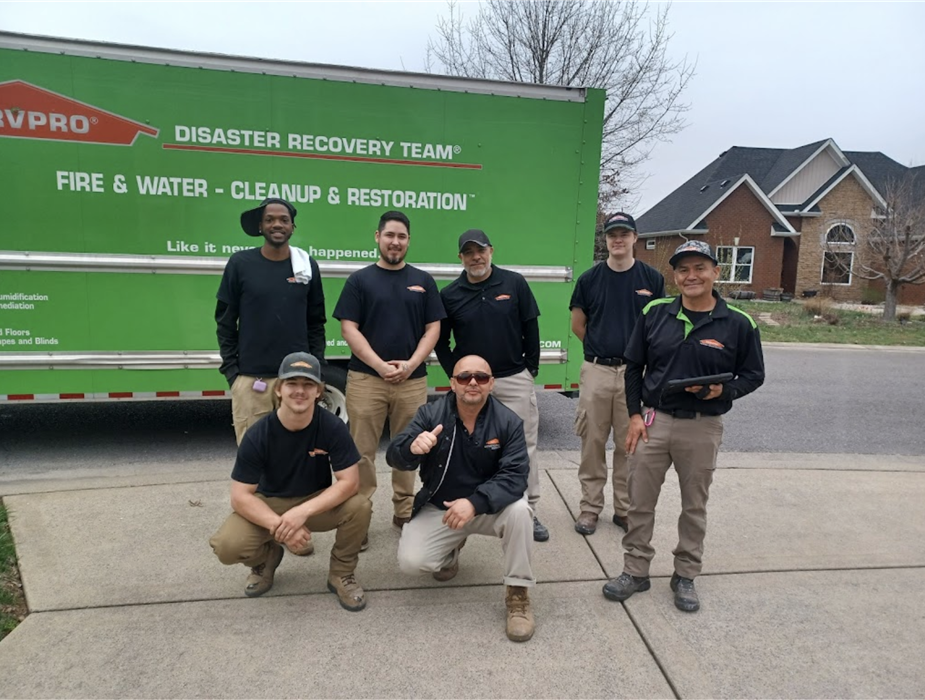 Our emergency response team is available to respond to your flood or water leak emergency 24/7/365 Here in Dekalb County.
Our emergency response team is available to respond to your flood or water leak emergency 24/7/365 Here in Dekalb County.
Dealing with water damage can be a stressful and overwhelming experience. Whether it's due to flooding, a burst pipe, or a leaking roof, water damage can wreak havoc on your property, possessions, and peace of mind. One of the critical aspects of handling water damage is navigating the insurance claims process. Knowing what to expect and how to maximize your claim can make a significant difference in your recovery. With many years of experience serving Buford, Suwanee, Hamilton Mill and surrounding areas, we wrote this blog to provide expert tips and tricks on navigating insurance claims for water damage. This way, you can secure the compensation you deserve while ensuring a smooth claims process.
Understanding Your Insurance Policy
The first step in navigating insurance claims for water damage is understanding your insurance policy. It's crucial to be familiar with the terms and conditions, as well as the extent of coverage provided. Some policies cover water damage from sudden and accidental events, while others exclude specific causes such as flooding. Here are a few tips to help you understand your policy:
- Review your policy documents and declarations page, which will outline your coverage limits and deductibles.
- Identify the specific perils covered and any exclusions, paying close attention to water damage-related incidents.
- Contact your insurance agent or company if you have any questions or need clarification about your coverage.
Documenting the Damage and Initiating the Claim
Once you have a clear understanding of your policy and coverage, it's time to document the damage and initiate your claim. Proper documentation is crucial in ensuring that your claim is processed accurately and efficiently. Follow these steps for documenting the damage:
- Take photographs and videos of the affected areas and any damaged items. Be thorough and capture images from different angles to provide a comprehensive visual record.
- Create a detailed inventory of damaged items, including their age, purchase price, and replacement cost.
- Keep receipts and invoices for any expenses related to the water damage, such as temporary accommodations or emergency repairs.
After documenting the damage, contact your insurance company to initiate the claim process. Be prepared to provide the necessary information, including the cause of the water damage, the extent of the damage, and your policy number.
Working with Commercial Restoration Services
In many cases, the best way to address water damage is by working with professional commercial restoration services. These experts have the knowledge, experience, and equipment needed to effectively mitigate and repair water damage. When selecting a water damage restoration company, consider the following:
- Choose a reputable company with experience in handling insurance claims like SERVPRO of NW Dekalb/Dunwoody/Brookhaven. We can help you navigate the claims process and work directly with your insurer.
- Verify that the company is licensed, insured, and certified by industry organizations such as the Institute of Inspection, Cleaning and Restoration Certification (IICRC). Our technicians are trained through industry leading IICRC programs for your peace of mind.
- Request references and read reviews to ensure the company has a track record of success in water damage restoration. With over 150+ 5 star google reviews, our team has a track record of success that you can trust.
Involving commercial restoration services early in the process can expedite the insurance claim and increase the likelihood of a favorable outcome. These professionals can provide detailed estimates, documentation, and evidence to support your claim, ensuring you receive fair compensation.
Conclusion
Navigating insurance claims for water damage can be a daunting task, but with the right approach and assistance from professional commercial restoration services, you can successfully secure the compensation you deserve. By understanding your policy, documenting the damage, and working with experienced water damage restoration experts like our SERVPRO team, you can minimize the stress and financial burden associated with water damage recovery.
In case you need help with your water damage restoration project, give us a call at (770) 396-3883. We’re always here to help!
Commercial Systems Prone to Water Damage: SERVPRO of NW Dekalb/Dunwoody/Brookhaven
4/28/2022 (Permalink)
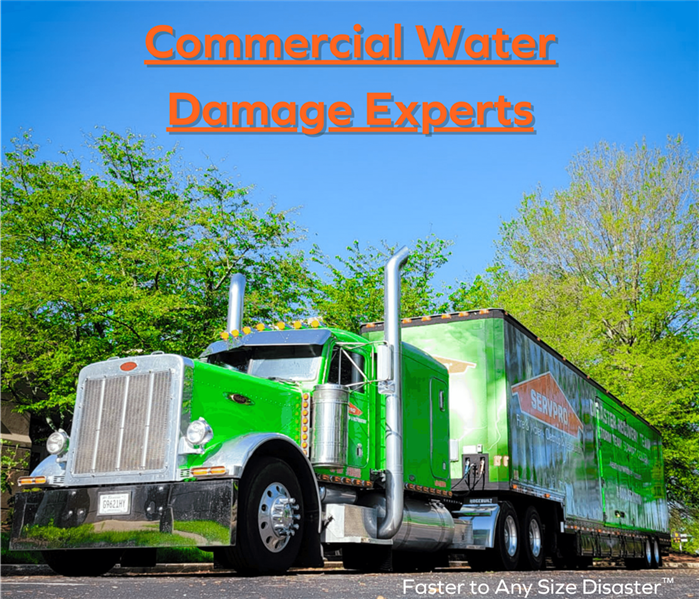 SERVPRO of NW Dekalb/Dunwoody/Brookhaven is ready for whatever happens! We'll restore your business after any size of property damage.
SERVPRO of NW Dekalb/Dunwoody/Brookhaven is ready for whatever happens! We'll restore your business after any size of property damage.
Commercial properties present unique risks when it comes to water damage in Dekalb County, GA. Unlike residential homes, which are usually one story and have easily accessible crawl spaces and attics, commercial buildings can be many stories high with flat roofs and multiple storefront windows. They also often have expensive specialized equipment that can be very costly to repair or replace if damaged by water. In this blog post, we will discuss the different parts of a commercial building that are at risk for water damage, as well as some tips on how to prevent it.
Plumbing Systems
The first and most obvious risk for water damage in a commercial property is the plumbing system. Because commercial buildings have more bathrooms, kitchens, and other water-using fixtures, they also have larger and more complex plumbing systems. These systems are often located in hard-to-reach places, making them difficult to repair if they spring a leak.
One of the main water damage challenges according to The Hartford Insurance is an improperly maintained sprinkler system. By law, most commercial buildings must have a fire sprinkler system, but many building owners forget to regularly maintain and test these systems. While a well-maintained fire sprinkler system can help prevent extensive fire damage in the event of a fire, improper maintenance or disaster planning can cause extensive water damage that can flood multiple floors.
Another plumbing risk is burst pipes. Commercial buildings, especially high rises tend to run at a higher pressure than residential buildings. Therefore, a burst pipe has the potential to release significantly more water than a home.
One of the ways in which we help commercial property owners prevent catastrophic property damage before it happens is through our app-based Emergency Response Planning program (ERP).
Roofing Systems
In addition to the plumbing system, there are a number of exterior commercial building components that can experience water damage. One of the most common is the flat roof. Because flat roofs are not sloped like traditional pitched roofs, they tend to pool water instead of shedding it. This can lead to leaks and eventually, if left unaddressed, major water damage.
Some common commercial roofing systems include:
- Built-up Roofing (BUR): Often called tar and gravel roofs, these commercial roofing systems are built with a semi-continuous membrane installed in layers, then covered in aggregate. While they are usually simple to maintain, best practices suggest inspecting the roof for deterioration and possible leak points at least twice yearly.
- Thermoplastic Single-Ply Membrane Roofing (PVC & TPO): These roofs are installed in large rolls that are then welded together at the seams with heat. The material is very durable and oil-resistant. However, the heat-welding methods require skilled installation, which can lead to weak points and leak-prone areas if not performed correctly.
- EPDM Roofing: Some roofers call these "rubber roofs" because the material they are made of, ethylene propylene diene monomer is very rubber-like. This kind of roof is derived from oil and natural gas, and appears dark gray or black. When installed correctly and with the highest thickness available, this type of commercial roof will last a very long time with little to no issues. Unless you experience storm damage in your area, an annual check for leaks around the roof penetrations should suffice.
Window Systems
Commercial window systems are built for durability and use, however, they can often present a unique water damage challenge for commercial facilities. Most aluminum glazing systems aren't intended to be 100% waterproof. Most commercial window systems are meant to limit water penetration during extreme circumstances while also weeping water back out to the exterior.
By directing all moisture to the sill flashing, storefront systems limit water penetration. It's critical that the sill flashing be installed correctly in order to avoid water damage. Making sure that sealant is put on the top of the rear leg before installing the sill is one of the most important aspects of a good installation.
The most essential aspect of maintaining water penetration with a storefront is end dam fastening and sealing. Water will enter the building through the jamb locations if end dams are not properly fastened and sealed. Improperly (or missing) end dams can cause significant water damage to the interior drywall or flooring around commercial storefront windows.
Like anything else in a building, time and the elements can cause wear and tear and failure of these commercial window water control systems.
Commercial Water Damage Inspection Services
So if you notice moisture or water damage around your storefront windows, you should consider calling SERVPRO of NW Dekalb/Dunwoody/Brookhaven to inspect for potential water damage issues. Our technicians are trained to identify, troubleshoot, and restore all types of commercial water issues.
Call today to schedule your commercial service!
(770) 396-3883
Tips to Stay Safe during Fire Damage: SERVPRO of NW Dekalb/Dunwoody/Brookhaven
3/29/2022 (Permalink)
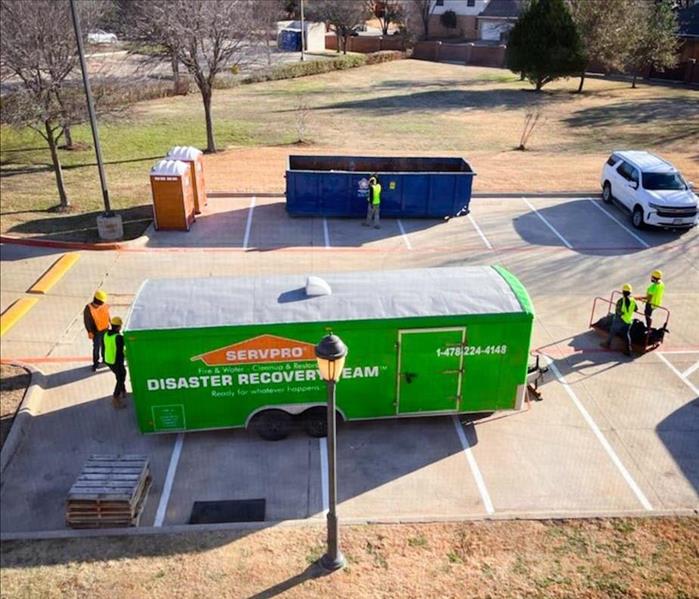 No matter how serious your property damage may be, SERVPRO of NW Dekalb/Dunwoody/Brookhaven is your local expert for restoring your home or business.
No matter how serious your property damage may be, SERVPRO of NW Dekalb/Dunwoody/Brookhaven is your local expert for restoring your home or business.
It's that time of year again - fire season in Dekalb County, GA, and surrounding areas. Between February and May, the weather gets hotter and drier, while the risk of house fires rises. A fire may start from a variety of sources, ranging from a faulty wire to an overloaded outlet to a kitchen mishap to a bonfire left unattended. It's critical to know how to react quickly and effectively if your home catches fire.
Here's What You Need To Know If A Fire Starts:
The first line of defense against a house fire is to know how to use the proper fire extinguisher for the situation. This simple procedure can help save lives and hundreds of thousands of dollars in property damage. If the fire spreads uncontrollably, evacuate immediately and stay away, then call 9-1-1. Leave all of your belongings where they are and save yourself and your loved ones.
If your clothing ignites, remember the old adage: Stop, Drop, and Roll.
It's critical to utilize the stairs if you live in a building with elevators in case of a fire. The elevator electrical system may be damaged by a fire, causing the shaft to operate like a chimney and rapidly fill up with deadly fumes.
Doors may be used to your advantage in a fire, potentially saving your life. If the doorknob or handle is hot, don't open it. If you can't exit through the primary route, look for another option. Do not open any doors that are warm to the touch.
Close any doors that might obstruct your exits, lay a wet towel beneath the doors, and call the fire department or 9-1-1 if flames, heat, or fire block your avenues of escape. Tell them exactly where you are so they can find you.
If you're near a window that you can't use as an escape, open it and wave a brightly colored cloth or use your phone flashlight to signal for help.
What To Do After a Fire
After a fire, it is important to contact a professional fire damage restoration company like SERVPRO of NW Dekalb/Dunwoody/Brookhaven. We have the training, experience, and equipment to properly restore your home - "Like it never even happened."
If you try to clean up the fire damage yourself, you could end up making the situation worse both in your home and with your insurance company's process.
Trust the experts, and call today!
6 Simple Maintenance Tips to Prevent Water Damage in Your Home| SERVPRO® of NW Dekalb/Dunwoody/Brookhaven
3/22/2022 (Permalink)
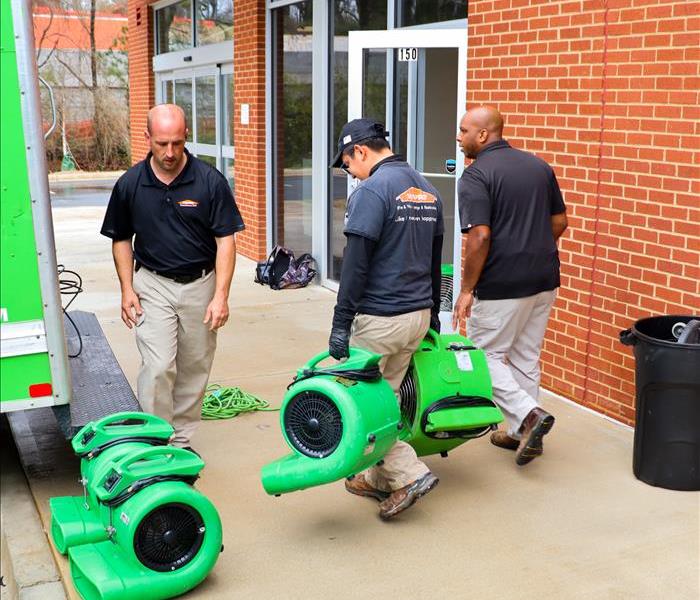 Our SERVPRO of NW Dekalb/Dunwoody/Brookhaven technicians are ready to assist you at a moment's notice. Call today for immediate assistance!
Our SERVPRO of NW Dekalb/Dunwoody/Brookhaven technicians are ready to assist you at a moment's notice. Call today for immediate assistance!
5 Simple Maintenance Tips to Prevent Water Damage in Your Home| SERVPRO® of NW Dekalb/Dunwoody/Brookhaven
Water damage is both expensive and inconvenient. SERVPRO of NW Dekalb/Dunwoody/Brookhaven, your local water damage expert, has seen this happen too many times. It will help you prevent water damage and lower your home maintenance costs in the long run if you take care of your property. You're undoubtedly feeling concerned if your home floods. However, by following these simple maintenance ideas, you can drastically reduce the risk of damage.
1) To prevent dampness and moisture, replace the old caulk around your windows.
We receive a lot of calls regarding window caulk water damage repair in Brookhaven, GA and the surrounding areas. Caulking your windows not only prevents water leaks but also helps to increase the efficiency of your air conditioner while keeping the outside air out of your house. It's a simple operation that any homeowner can complete. Depending on the type, caulking can last anywhere from five to ten years; nevertheless, you should check your caulking every year and replace it if it begins to fracture or peel off the window.
Exterior door flashings should be inspected to see whether there are any tears or rust that would allow water in. Caulking the doors will also help prevent early door flashing failure.
2) Check your water heater for leaks to avoid it from flooding and causing water damage.
When it comes to our emergency water cleanup services, heater failure is all too prevalent. Regularly maintaining your property may help you avoid a massive water heater flood. Make sure the temperature of the water heater's thermostat is set precisely and functioning properly to prevent pressure from developing, which may result in a leak.
Water heaters frequently develop rust or silt inside, resulting in undesirable tastes and odors in the water. If your water begins to make unusual noises, it's probably time for a checkup or a new water heater.
3) Immediately replace any leaking or damaged water hoses or connections on your plumbing appliances
Be on the lookout for any holes, kinks, fraying, deterioration, or corrosion on your plumbing's hoses and connections. If you detect any damage, have it repaired right away. In order to avoid pricey water damage expenses down the road, most manufacturers and plumbers recommend changing water hoses and connections every three to five years.
(5) Examine the roof and gutters for debris and any signs of moisture damage in the attic.
If the roof on your home does not drain properly, it may deteriorate. Water can seep into your property if this happens.
Look for dampness around vents, valleys, chimneys, pipes, and skylights. Any place on your roof with holes or connections is a potential source of leaks later on. If the flashing deteriorates as a result of weather, rusting, or losing its seal, water may flow into your house.
Check the inside of your attic for dampness or mold development. If you find moist, damaged, or moldy insulation, rotted or discolored boards or ceiling panels, or sheetrock puckering, you may have a leak on your hands.
6) Clean and inspect the HVAC condensation lines for any leaks or obstructions.
If your HVAC condensation lines become clogged, water leaks out and damages your home's surrounding areas. Check your condensation pipes on a monthly basis to ensure they're clear of debris.
Pour one-half cup of plain, white vinegar down the condensate drain once to four times a year to clear out blockages and grime. Bleach should not be used since it might harm your metal drain pan and cause it to degrade. If you detect an accumulation of debris or mold, our SERVPRO experts can assist you with any water damage.
We are Here to Help You with Any Water Repair Needs You May Have
If you have water damage in your house or workplace, call our team at SERVPRO of NW Dekalb/Dunwoody/Brookhaven for immediate assistance.
Our courteous, well-experienced staff are always happy to answer any questions you might have. Save our phone number in case you need help again in the future, or contact us right away for a prompt response from one of our IICRC-trained water restoration specialists.
We are always Here to Help!





 24/7 Emergency Service
24/7 Emergency Service